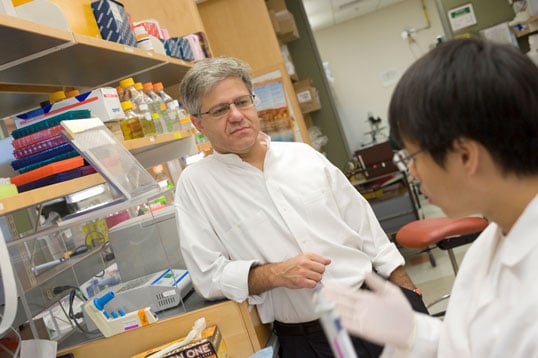
Phillip Zamore, PhD, observes a student in his lab. Dr. Zamore is co-principal investigator of a new grant from the National Institutes of Health that will integrate formal career planning into students’ training.
Internationally renowned RNAi expert Phillip Zamore, PhD, followed a traditional pathway to success as an academic research scientist.
But while they look up to him as a role model, many of his students and postdoctoral fellows at the Graduate School of Biomedical Sciences will need to pursue different careers in today’s biomedical sciences job market, where less than 25 percent of newly minted science PhDs can secure tenure-track faculty jobs.
Dr. Zamore is co-principal investigator of a new grant from the National Institutes of Health that will integrate formal career planning into students’ long years of training. UMass Medical School is in the first group of 10 graduate schools nationwide to be awarded the new Broadening Experience in Scientific Training (BEST) grant from the NIH.
“Our students shouldn’t stumble into these careers, which are essential for a healthy, productive economy,” said Zamore, Howard Hughes Medical Institute Investigator, the Gretchen Stone Cook Chair of Biomedical Sciences, and professor of biochemistry and molecular pharmacology. “This grant is about helping people help themselves to identify the career that will be fulfilling.”
With the five-year, $2 million grant, Zamore and Cynthia Fuhrmann, PhD, assistant dean of professional and career development for the GSBS, will implement “An Integrated Curriculum and Community-Based Approach to Career Development” which will guide students and postdocs to create and implement a strategic plan for building the skills and experience needed to reach their career objectives.
“We want to empower students to make career decisions early in their training, so that by their third year they can take strategic, time-efficient actions to prepare for those careers,” said Dr. Fuhrmann, a former biochemist whose research interests now focus on improving the career development of scientists. Fuhrmann, who joined the GSBS in 2012 from the University of California San Francisco, brings years of experience directing programs in professional skills training and career preparation for doctoral students and postdocs in the sciences.
The centerpiece of the curriculum will be myIDP, an online tool developed by Fuhrmann and colleagues in collaboration with the American Academy for the Advancement of Science and the journal Science that helps graduate students, postdocs and even mid-career scientists evaluate their skills, interests, and values, and identify which scientific career paths best match them.
Establishing GSBS learning communities is another focus of the grant. “The idea is to provide the students with an opportunity to both teach each other and to learn from a mentor with experience in that field, noted Zamore. “myIDP will help an individual identify their top two or three career aspirations. Then they can join with like-minded students and a career mentor in that field to figure out what it takes to be ready.”
Related links on UMassMedNow:
UMMS tech tool helps scientists navigate career path
Newsmaker: Career planning tool wins AAMC award